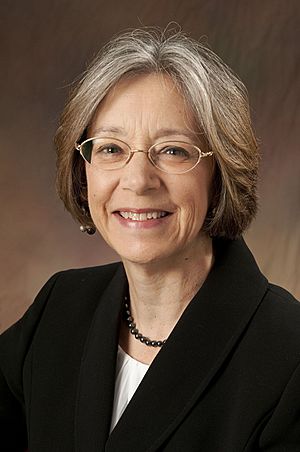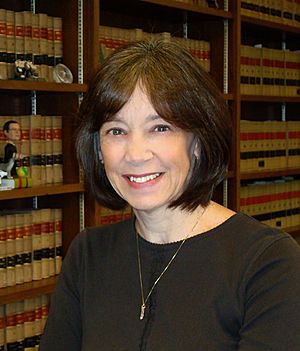Diane Wood facts for kids
Quick facts for kids
Diane Wood
|
|
|---|---|
 |
|
| Senior Judge of the United States Court of Appeals for the Seventh Circuit | |
| In office September 7, 2022 – April 30, 2024 |
|
| Chief Judge of the United States Court of Appeals for the Seventh Circuit | |
| In office October 1, 2013 – July 3, 2020 |
|
| Preceded by | Frank H. Easterbrook |
| Succeeded by | Diane S. Sykes |
| Judge of the United States Court of Appeals for the Seventh Circuit | |
| In office June 30, 1995 – September 7, 2022 |
|
| Appointed by | Bill Clinton |
| Preceded by | William J. Bauer |
| Succeeded by | John Z. Lee |
| Personal details | |
| Born |
Diane Pamela Wood
July 4, 1950 Plainfield, New Jersey, U.S. |
| Spouses | Steve Van (Early 1970s) Dennis J. Hutchinson
(m. 1978; div. 1998)Robert L. Sufit
(m. 2006) |
| Children | 6 |
| Education | University of Texas at Austin (BA, JD) |
Diane Pamela Wood (born July 4, 1950) is an American lawyer. She is currently a director at the American Law Institute. She also teaches at the University of Chicago Law School. Before this, she was a judge on the United States Court of Appeals for the Seventh Circuit.
After working as a private lawyer and for the government, Wood became a law professor. She was one of the first women to teach law at the University of Chicago. President Bill Clinton chose her to be a judge in 1995. As a judge, she was known for her thoughtful ideas.
Contents
Early Life and School
Diane Pamela Wood was born on July 4, 1950. Her birthplace was Plainfield, New Jersey. Her parents were Lucille Padmore Wood and Kenneth Reed Wood. She grew up in Westfield, New Jersey. Her father worked as an accountant. Her mother worked for the Girl Scouts.
Diane was the middle child of three. When she was 16, her family moved to Houston, Texas. In 1968, she finished Westchester High School. She was the top student in her graduating class.
Wood went to the University of Texas at Austin. She earned a bachelor's degree in English in 1972. She then studied law at the University of Texas School of Law. There, she helped edit the Texas Law Review. She was also part of a group for women in law.
She earned her law degree in 1975. She graduated with high honors. She was also one of the first women to join the Friar Society at the university.
Career as a Lawyer and Teacher
After law school, Wood worked for a judge named Irving Loeb Goldberg. This was from 1975 to 1976. Then, she worked for Justice Harry Blackmun at the United States Supreme Court. This was from 1976 to 1977. She was one of the first women to work for a Supreme Court justice.
From 1977 to 1978, Wood worked for the U.S. Department of State. She was an attorney-advisor there. Then, she worked at a law firm in Washington, D.C. from 1978 to 1980.
Wood started teaching law in 1980 at Georgetown University. In 1981, she moved to Chicago. She joined the faculty at the University of Chicago Law School. She was the third woman ever hired as a law professor there. She was the only woman on the faculty when she started.
She became a full professor in 1989. From 1990 to 1995, she was an Associate Dean. She was also the first woman to hold a special named teaching position. Since becoming a judge, she still teaches at the University of Chicago Law School.
Wood also worked for the United States Department of Justice. She was a special assistant from 1985 to 1987. From 1993 to 1995, she worked in the Antitrust Division. This division deals with rules for fair competition.
Wood is a member of the American Law Institute. She also belongs to the American Society of International Law. She is a Fellow of the American Academy of Arts and Sciences. She has worked on many law reform projects. She also helped create rules at the University of Chicago to ensure fair treatment for everyone.
In 2021, the University of Chicago Law School honored Wood. They celebrated her 25th anniversary as a judge. Her colleagues wrote special essays about her work.
Federal Judicial Service
On March 31, 1995, President Bill Clinton nominated Diane Wood to be a judge. She was chosen for the United States Court of Appeals for the Seventh Circuit. The Senate approved her choice without any objections. She officially became a judge on June 30, 1995.
Wood was the second woman ever to serve on the Seventh Circuit. She is known for bringing judges together. She helps them agree on decisions. She was seen as a strong intellectual voice on the court. She served as Chief Judge from October 1, 2013, to July 3, 2020.
On December 9, 2021, Wood announced she would take "senior status." This means she would work a reduced schedule when her replacement was confirmed. She officially took senior status on September 7, 2022. She retired from the bench on April 30, 2024.
Wood was considered a possible candidate for the United States Supreme Court. This was during the Obama administration. She was even interviewed by President Obama for a Supreme Court position.
Important Rulings
Fairness for Everyone
- Wetzel v. Glen St. Andrew Living Community (2018): Wood ruled in a case about a woman who was treated unfairly. She lived in a senior-living facility. Other residents were mean to her because of her sexual orientation. The management did not help her. Wood ruled that a law called the Fair Housing Act protects people from discrimination based on sexual orientation. She also said landlords must act if they know about such unfair treatment.
- Hively v. Ivy Tech Community College of Indiana (2017): Wood wrote the main opinion for the court in this case. The court decided that a law against sex discrimination also covers discrimination based on sexual orientation. The case was about a teacher who said she was not promoted because she was a lesbian. Wood's opinion explained that if a man in a relationship with a woman would be promoted, then a woman in a relationship with a woman should also be promoted. This was the first time a federal appeals court made such a ruling.
Separation of Church and State
Wood wrote for the majority in a case about school bussing. The court found that a state official did not break the Constitution. The official denied bussing to a Catholic school because another Catholic school was nearby. This decision upheld the idea of keeping government and religion separate.
- Christian Legal Society v. Walker (2006) (dissenting): This case was about a Christian student group at a university. The group wanted to require members to sign a statement of faith. The university had a non-discrimination policy. Wood disagreed with the majority's decision to allow the group to appeal. She said there wasn't enough information yet. She believed that if the university was truly discriminating, then the court should stop them.
Immigration Decisions
- Bayo v. Napolitano (2010): Wood wrote for the court in this case. The court decided that people who are not citizens must knowingly agree to give up their rights. It also said the government can remove someone who is in the U.S. illegally for any valid reason.
Rules About Weapons
- Bevis v. City of Naperville (2023): This case challenged a state ban on certain types of weapons. Wood wrote that these weapons are not protected by the Second Amendment in the same way as other firearms. She explained that these weapons are more like military weapons. She also said that bans on these weapons fit with the history of weapon rules.
Fair Housing Act
- Bloch v. Frischholz (2008): This case was about a Jewish family. They put a religious item called a mezuzah on their condo door. The condo association kept removing it. The family sued, saying their rights were violated. Wood disagreed with the first ruling. She believed there was enough proof of unfair treatment. Later, the full court agreed with Wood's original opinion. This showed her strong support for religious freedom.
Freedom of Speech
- National Organization for Women v. Scheidler (2001, 2005): Wood found that a lower court was right to allow a group to seek an order against violent actions by protesters. She recognized that free speech is very important. However, she said the order only stopped violent behavior. It did not stop people from expressing their views.
- Goldwasser v. Ameritech Corp. (2000): In this case, Wood decided that a company had not broken antitrust laws. These laws are about fair business competition. She said that the plaintiffs only claimed a violation of a telecommunications law. Four years later, the Supreme Court agreed with Wood's position in a similar case.
COVID-19 Rules
In September 2020, Wood wrote the opinion in a ruling about COVID-19 orders. The ruling was against a challenge from a political party in Illinois. They were challenging the state governor's rules during the pandemic.
Voting Rights
In League of Women Voters v. Sullivan (2021), Wood wrote a unanimous ruling. The court struck down a law in Indiana. This law allowed the state to remove voters from lists without telling them first. Wood was joined by two other judges in this decision.
Law Reform Work
Wood was chosen for the American Law Institute in 1990. She joined its Council in 2003. She leads the committee that chooses new members. She also advises on projects about international law and American Indian law. She has worked on many projects to improve laws.
Writings
Diane Wood is known for her writing. She has written many articles and books about law. Her writings cover many different areas of law. Some of her works include:
- The Changing Face of Diversity Jurisdiction (2009)
- Trade Regulation: Cases and Materials (a textbook she co-wrote)
- The Bedrock of Individual Rights in Times of Natural Disaster (2008)
- Our 18th Century Constitution in the 21st Century World (2005)
- The Rule of Law in Times of Stress (2003)
- Sex Discrimination in Life and Law (1999)
Personal Life
Wood is married to Robert L. Sufit. He is a professor of neurology at Northwestern University. She has six children, including three stepchildren. These are from her previous two marriages.
She was married to Dennis J. Hutchinson from 1978 to 1998. He was also a law professor. Her first husband was Steve Van. They were both law students when they married.
Wood enjoys playing music. She plays the oboe and English horn. She plays in several orchestras and bands in Illinois.
Wood lives in Hinsdale, Illinois. She is a Protestant.
See also
- List of law clerks of the Supreme Court of the United States (Seat 2)
- Barack Obama Supreme Court candidates
- Hively v. Ivy Tech
 | Delilah Pierce |
 | Gordon Parks |
 | Augusta Savage |
 | Charles Ethan Porter |


